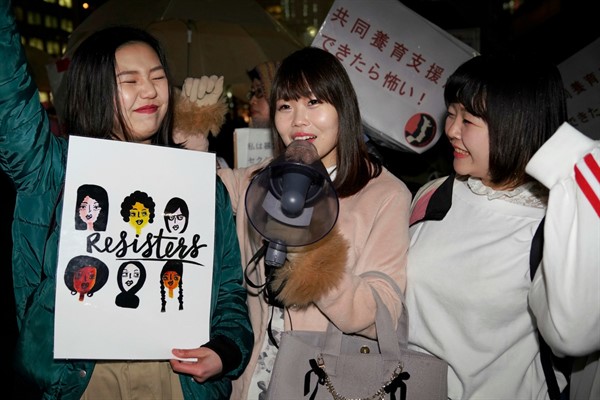Since beginning his current term in office eight years ago, Japanese Prime Minister Abe Shinzo has repeatedly pledged that by 2020, 30 percent of leadership positions in the country would be held by women. But according to the World Economic Forum’s latest annual Global Gender Gap Report, women currently occupy only 15 percent of leadership posts in the country. To the surprise of no one, meeting Abe’s objective this year is “impossible, realistically speaking,” as one Japanese official acknowledged to the Mainichi newspaper in June. The government will instead push to hit its target “as early as possible by 2030.”
Gender inequality in Japan has been a source of domestic concern and international embarrassment for decades, not to mention a persistent drag on the economy. After Abe swept back into office following a landslide victory for his Liberal Democratic Party in the 2012 general election—having previously served a one-year stint in the top job during the 2000s—he made women’s empowerment a key plank of his “Abenomics” reform agenda. He seized on the goal of increasing the share of women in leadership positions to 30 percent, which the government originally adopted in 2003, and made it a staple of his speeches to audiences overseas. Taking inspiration from the Goldman Sachs strategist Kathy Matsui, a leading proponent of gender-based reforms in Japan, Abe borrowed her term, “womenomics,” to describe his platform.
The logic behind the reforms is sound, especially given Japan’s demographic headwinds. With a highly aged population and one of the world’s lowest fertility rates, by 2055, the workforce is projected to shrink by 40 percent. There are more registered pets in Japan than children under the age of 15. This makes it imperative for Japan to harness the latent potential of its existing population. Matsui and her Goldman Sachs colleagues argue that leveling the gender playing field when it comes to jobs and salaries would boost the country’s GDP by up to 15 percent.

